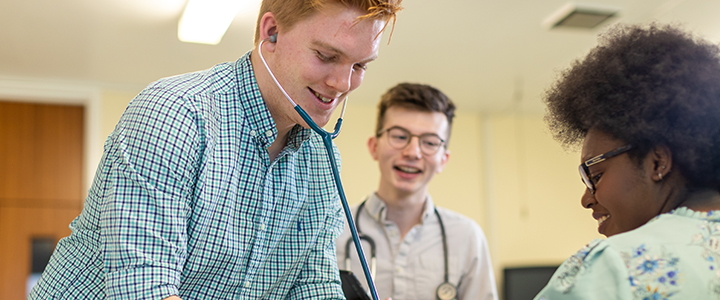
Fitness to study
In order to become a doctor, we need to make sure that you are fit to study medicine. This covers everything from looking after your personal health and wellbeing to the measures we have to protect patients.
Physical and mental fitness
We want you to be safe and supported while studying medicine with us. As such we need to make sure that the relevant measures are in place to achieve that. We try to make reasonable adjustments wherever possible to allow you to study and succeed in medicine.
Health
All offers are subject to a satisfactory health screening and an occupational health assessment.
In order to study medicine you must have received the following vaccinations:
- Hepatitis B
- Measles, mumps, and rubella (or evidence of immunity to measles and rubella)
- Varicella (or a history of having chickenpox)
- Tuberculosis
We will require screenings to ensure you do not pose a risk of passing on Hepatitis B, Hepatitis C or HIV to your patients.
We may require independent advice from occupational health and refer you to their services throughout your course. This may also involve retesting, further vaccinations or other appropriate interventions.
While we still encourage all eligible students to become fully vaccinated against Covid-19, there is currently no impediment to you starting your course, regardless of your Covid-19 vaccination status.
Accessibility
We welcome applications from all potential students with disabilities or any ongoing physical, mental health or educational issues.
When thinking of applying, please contact the School of Medicine to let us know about your circumstances.
The University Disability Support Services support the University community in creating an inclusive and equitable teaching and learning environment to the benefit of all students. Our specialist service provides student-led support to enable disabled students to flourish as independent learners.
They are here to help students if they have a disability, mental health difficulty, long-term medical condition, autistic spectrum condition, or a specific learning difference such as dyslexia, dyspraxia, dyscalculia or ADHD.
Disability Support Services
Contact the Medicine Hub
Professionalism and Fitness to Practise
In order to become a doctor, you must demonstrate you are fit to practise. This means that you will do nothing to diminish the trust which sick or vulnerable people and their relatives place in you.
We must ensure that no member of the public is harmed as a consequence of participating in medical student training. So, we must be confident in your conduct and ability to be professional and practise as a doctor.
Professionalism
Doctors and medical students are expected to behave in a way that justifies the trust the public has in doctors (RCP, 2005).
During your medical training you will learn about, experience and develop professional behaviour. Medical schools also use training as an opportunity to identify types of behaviour that are not safe. If necessary, appropriate action will be taken to help students to improve their behaviour, or if this is not possible or is unsuccessful, to make sure they do not practice as doctors.
We champion students who show excellent professional behaviour and celebrate their successes where appropriate.
Where issues are raised, we may need to take action. We have a committee which oversees the process of reporting and investigating professionalism concerns and ensuring the process is fair. The committee handles low-level professionalism issues to help resolve them before they develop into major issues.
Major issues which will likely lead to an investigation and may impact your place with us can include:
- drug or alcohol misuse
- aggressive, violent or threatening behaviour
- cheating or plagiarism
- dishonesty
- persistent inappropriate attitudes or behaviour
Criminal Offences
All medical students are required to have a criminal record check before they begin their course.
As part of your application you will be required to complete an enhanced disclosure and barring service (DBS) check.
You must advise us of any criminal convictions you may have.
Find out more on UCAS
Failure to disclose this information may result in revoking an offer or the termination of your place studying medicine.
If you are worried about your eligibility, please get in touch. This is so our professionalism and fitness to practice team can advise.
Contact the Medicine Hub
Fitness to Practise
If we have any serious concerns about your fitness to practise, either before or after you have accepted an offer or during your studies, you will be subject to a Fitness to Practice investigation.
School of Medicine policies and regulationsFind out more about Fitness to Practise procedures (pdf)
Depending on the outcome of the investigation, we reserve the right to revoke offers should serious concerns arise before starting the course.
If you are already studying with us, a Fitness to Practise investigation could result in conditions you must observe. In serious cases a Fitness to Practise investigation could result in expulsion from the course, and you may be unable to study/practise medicine in the UK in the future.
General Medical Council and Medical Schools Council advice